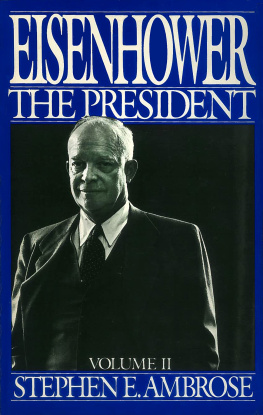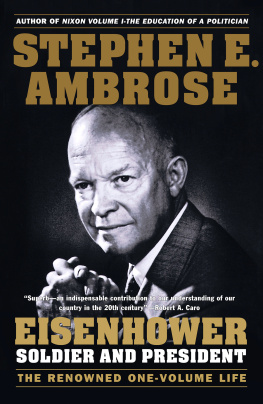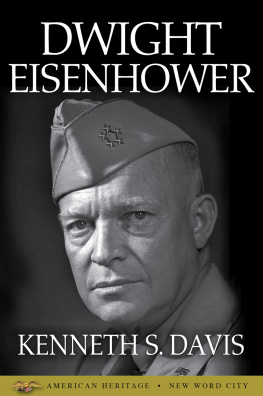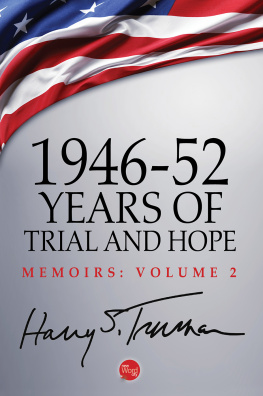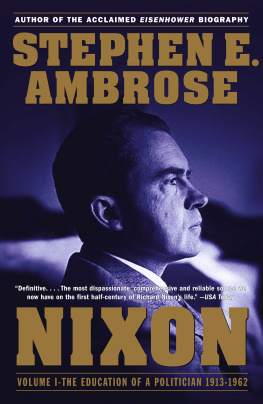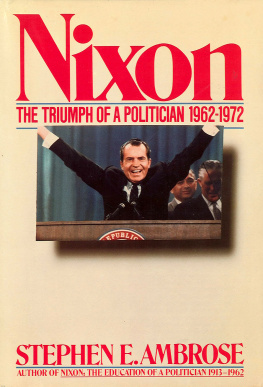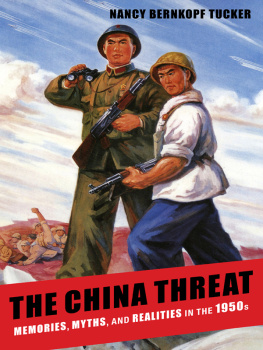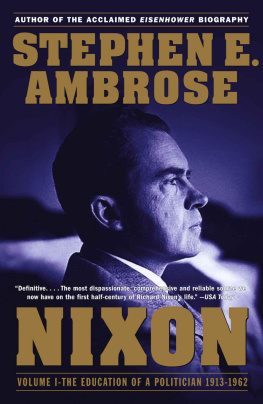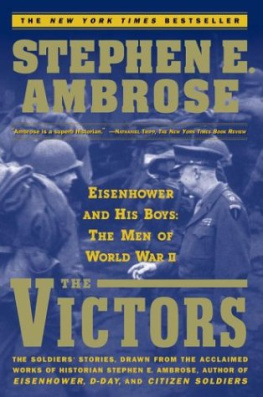We hope you enjoyed reading this Simon & Schuster eBook.
Join our mailing list and get updates on new releases, deals, bonus content and other great books from Simon & Schuster.
C LICK H ERE T O S IGN U P
or visit us online to sign up at
eBookNews.SimonandSchuster.com
Thank you for downloading this Simon & Schuster eBook.
Join our mailing list and get updates on new releases, deals, bonus content and other great books from Simon & Schuster.
C LICK H ERE T O S IGN U P
or visit us online to sign up at
eBookNews.SimonandSchuster.com
A LSO BY S TEPHEN E. A MBROSE
Halleck:
Lincolns Chief of Staff
Ikes Spies:
Eisenhower and the Espionage Establishment
Rise to Globalism:
American Foreign Policy 19381970
Crazy Horse and Custer:
The Parallel Lives of Two American Warriors
Eisenhower and Berlin, 1945
Duty, Honor, Country:
A History of West Point
The Supreme Commander:
The War Years of General Dwight D. Eisenhower
Eisenhower
(Volume One)
Soldier, General of the Army, President-Elect
18901952
Copyright 1984 by Stephen E. Ambrose
All rights reserved including the right of reproduction in whole or in part in any form Published by Simon and Schuster
A Division of Simon & Schuster, Inc.
Simon & Schuster Building
Rockefeller Center
1230 Avenue of the Americas
New York, New York 10020
www.SimonandSchuster.com
SIMON AND SCHUSTER and colophon are registered trademarks of Simon & Schuster, Inc.
Designed by Edith Fowler
Cover design 1985 by One Plus One Studio
Cover photograph by Arnold Newman
Library of Congress Cataloging in Publication Data
Ambrose, Stephen E.
Eisenhower.
Maps on lining papers.
Includes bibliographies and index.
Contents: v. 1. Soldier, general of the army, President-elect, 18901952v. 2. The President.
1. Eisenhower, Dwight D. (Dwight David), 18901969. 2. PresidentsUnited StatesBiography. I. Title.
E836.A828 1983 973.9210924 83-9892
ISBN 0-671-44069-1 (v. 1)
ISBN 0-671-49901-4 (v. 2)
ISBN-13: 978-1-4767-4587-9 (eBook)
For Steve and Cee Cee and Tim and RonnieThey all liked Ike
CONTENTS

INTRODUCTION

D WIGHT E ISENHOWER is one of only two Republicans (the other was Grant) to serve two full terms as President. Along with the two Roosevelts, he is the only twentieth-century President who, when he left office, still enjoyed wide and deep popularity. And he is the only President in this century who managed to preside over eight years of peace and prosperity.
Clearly, Eisenhower was doing something right. Just as clearly, Eisenhowers famous luck helped him. What follows is an account of how it was done, and of Eisenhowers role in bringing it about.
Eisenhower is at the center of events. Just as in Overlord, when he was the funnel through which everything had to pass, the one man who was responsible for the whole operation, so too as President, he was the one man who could weigh all the factors in any one decisionthe political repercussions, the effect on foreign policy, the economic consequences, and the myriad of other considerations involvedbefore acting.
Eisenhower probably complained more about the Presidency than most of his predecessors and successors, and probably enjoyed it more. Although he exercised freely the soldiers right to grouse, he wanted to be in the position in which he could have a maximum influence on events. He liked making decisions. The primary reason was that he had such complete self-confidence that he was certain he was the best man in the country to make the decisions. So certain, indeed, that the chief reason he agreed to run for re-election in 1956 was that he could not think of any other man who could do his job.
He was sure he made the best decisions. In my own view, sometimes he did, sometimes he didnt. I think he was badly wrong on McCarthy and segregation, brilliantly right in his management of the numerous war scares of his first term, and during the Berlin crisis of 1959, consistently correct in his opposition to putting ever-greater sums into national defense, ambiguous and confused on nuclear-testing policy and disarmament. But my own prejudices and politics are unimportant, and I hope I have succeeded in resisting the temptation of inserting them into the text. What I have tried to do is present the record, to relate what Eisenhower did, and how and why he did it.
This book is based on the inner record of the Eisenhower Administration. The vast majority of the citations are to primary documents, many of them only declassified in the late seventies and early eighties. With the full record available to me, I quickly learned in writing this book that I could not rely on the memoirs, whether written or oral, nor on the contemporary reporting, nor the public papers and pronouncements, nor the monographs written on the basis of those sources. All were helpful, of course, to one degree or another, but the real story, the whole story, could come only from Eisenhowers own diary, memos, orders, and correspondence, from the minutes of the Cabinet, the National Security Council, and the Republican leaders meetings, from the transcripts of the telephone calls to and from the Oval Office, from the diaries of such people as Ann Whitman, James Hagerty, and Ellis Slater, and most of all from Andrew Goodpasters memoranda covering nearly every private conference Eisenhower held.
What the documents show, in my opinion, is how completely Eisenhower dominated events. Eisenhower, not Charlie Wilson, made defense policy; Eisenhower, not Foster Dulles, made foreign policy; Eisenhower, not Ezra Benson, made farm policy. Whether the policies were right or wrong, whether they reflected ambivalence and hesitation, or revealed the way in which Eisenhower was a prisoner of the technologists and scientists, or displayed bold and aggressive action, they were Eisenhowers policies. He ran the show.
As to Eisenhower the man, he is as appealing a human being as President as he was as Supreme Commander. Firm, fair, objective, dignified, he was everything most Americans wanted in a President. There were no real scandals in his Administration. In his private life, he prospered. He loved and cherished his wife, had the pleasure and the pride of having his son work for him in a critical post, and enjoyed to the full his grandchildren. His zest for life was strong. He loved to travel and indulged himself whenever he could. He had a loyal group of close friends, all of them millionaires, his gang as he called them. With them he could relax, play golf or bridge or go hunting and fishing, all passions with him, and just be himself.
A word about organization. When I finished the research and began writing, I was sorely tempted to do the book by subjects, breaking it down into chapters on Eisenhower and McCarthy, or Eisenhower and civil rights, or Eisenhower and Vietnam, thereby relating Eisenhowers relations with McCarthy, or his approach to civil rights, or his policies in Vietnam from beginning to end. But I eventually decided that such an organization would make the individual subjects easier to understand at the expense of understanding Eisenhower. What I wanted to convey was the magnitude and multitude of problems that come marching up to the President for solution, and the way in which each event relates to and influences others. For example, a decision Eisenhower made about Vietnam would have a major effect on his defense policy; a decision about Korea would be influenced by Senator McCarthys latest antics, and in turn would affect what McCarthy did the next day.
Next page
